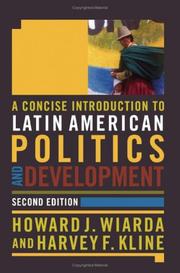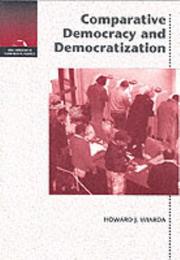| Listing 1 - 10 of 10 |
Sort by
|
Book
ISBN: 1597976369 9781597976367 9781597972901 1597972908 9781597972932 1597972932 Year: 2009 Publisher: Washington Potomac Books
Abstract | Keywords | Export | Availability | Bookmark
 Loading...
Loading...Choose an application
- Reference Manager
- EndNote
- RefWorks (Direct export to RefWorks)
How America's political divisions influence our foreign policy
Political culture --- United States --- ABŞ --- ABSh --- Ameerika Ühendriigid --- America (Republic) --- Amerika Birlăshmish Shtatlary --- Amerika Birlăşmi Ştatları --- Amerika Birlăşmiş Ştatları --- Amerika ka Kelenyalen Jamanaw --- Amerika Qūrama Shtattary --- Amerika Qŭshma Shtatlari --- Amerika Qushma Shtattary --- Amerika (Republic) --- Amerikai Egyesült Államok --- Amerikanʹ Veĭtʹsėndi︠a︡vks Shtattnė --- Amerikări Pĕrleshu̇llĕ Shtatsem --- Amerikas Forenede Stater --- Amerikayi Miatsʻyal Nahangner --- Ameriketako Estatu Batuak --- Amirika Carékat --- AQSh --- Ar. ha-B. --- Arhab --- Artsot ha-Berit --- Artzois Ha'bris --- Bí-kok --- Ē.P.A. --- EE.UU. --- Egyesült Államok --- ĒPA --- Estados Unidos --- Estados Unidos da América do Norte --- Estados Unidos de América --- Estaos Xuníos --- Estaos Xuníos d'América --- Estatos Unitos --- Estatos Unitos d'America --- Estats Units d'Amèrica --- Ètats-Unis d'Amèrica --- États-Unis d'Amérique --- Fareyniḳṭe Shṭaṭn --- Feriene Steaten --- Feriene Steaten fan Amearika --- Forente stater --- FS --- Hēnomenai Politeiai Amerikēs --- Hēnōmenes Politeies tēs Amerikēs --- Hiwsisayin Amerikayi Miatsʻeal Tērutʻiwnkʻ --- Istadus Unidus --- Jungtinės Amerikos valstybės --- Mei guo --- Mei-kuo --- Meiguo --- Mî-koet --- Miatsʻyal Nahangner --- Miguk --- Na Stàitean Aonaichte --- NSA --- S.U.A. --- SAD --- Saharat ʻAmērikā --- SASht --- Severo-Amerikanskie Shtaty --- Severo-Amerikanskie Soedinennye Shtaty --- Si︠e︡vero-Amerikanskīe Soedinennye Shtaty --- Sjedinjene Američke Države --- Soedinennye Shtaty Ameriki --- Soedinennye Shtaty Severnoĭ Ameriki --- Soedinennye Shtaty Si︠e︡vernoĭ Ameriki --- Spojené staty americké --- SShA --- Stadoù-Unanet Amerika --- Stáit Aontaithe Mheiriceá --- Stany Zjednoczone --- Stati Uniti --- Stati Uniti d'America --- Stâts Unîts --- Stâts Unîts di Americhe --- Steatyn Unnaneysit --- Steatyn Unnaneysit America --- SUA (Stati Uniti d'America) --- Sŭedineni amerikanski shtati --- Sŭedinenite shtati --- Tetã peteĩ reko Amérikagua --- U.S. --- U.S.A. --- United States of America --- Unol Daleithiau --- Unol Daleithiau America --- Unuiĝintaj Ŝtatoj de Ameriko --- US --- USA --- Usono --- Vaeinigte Staatn --- Vaeinigte Staatn vo Amerika --- Vereinigte Staaten --- Vereinigte Staaten von Amerika --- Verenigde State van Amerika --- Verenigde Staten --- VS --- VSA --- Wááshindoon Bikéyah Ałhidadiidzooígíí --- Wilāyāt al-Muttaḥidah --- Wilāyāt al-Muttaḥidah al-Amirīkīyah --- Wilāyāt al-Muttaḥidah al-Amrīkīyah --- Yhdysvallat --- Yunaeted Stet --- Yunaeted Stet blong Amerika --- ZDA --- Združene države Amerike --- Zʹi︠e︡dnani Derz︠h︡avy Ameryky --- Zjadnośone staty Ameriki --- Zluchanyi︠a︡ Shtaty Ameryki --- Zlucheni Derz︠h︡avy --- ZSA --- Η.Π.Α. --- Ηνωμένες Πολιτείες της Αμερικής --- Америка (Republic) --- Американь Вейтьсэндявкс Штаттнэ --- Америкӑри Пӗрлешӳллӗ Штатсем --- САЩ --- Съединените щати --- Злучаныя Штаты Амерыкі --- ولايات المتحدة --- ولايات المتّحدة الأمريكيّة --- ولايات المتحدة الامريكية --- 미국 --- Foreign relations administration. --- Foreign relations --- Decision making. --- Spojené obce severoamerické --- Decision making --- 1989 --- -United States --- Foreign relations administration --- États-Unis --- É.-U. --- ÉU
Book
ISBN: 1282494120 9786612494123 0739133055 9780739133057 9780739128831 0739128833 9780739128848 0739128841 9781282494121 6612494123 Year: 2009 Publisher: Lanham, MD Lexington Books
Abstract | Keywords | Export | Availability | Bookmark
 Loading...
Loading...Choose an application
- Reference Manager
- EndNote
- RefWorks (Direct export to RefWorks)
Conservative Brain Trust traces the rise, fall, and rise again of the American Enterprise Institute for Public Policy Research (AEI). More than that, it is the story of one of Washington's leading think tanks: what it's like to work there, how Washington works, and how AEI influences policy, including policy on the controversial Iraq War. This is a wide-ranging review of the Washington think tank world, focused particularly on AEI. The book is a social science and political study of the role of think tanks in Washington policy-making and, in part, a personal memoir of the author's adventures and perceptions in seeking to link academic research and American foreign policy. What emerges is a portrait of AEI as an influential, but also troubled, think tank with access to the highest levels of the U.S. government. Irreverent as well as analytic, the author recounts his adventures and experiences in the think tank and policy worlds.
Policy sciences. --- Economics --- Economic theory --- Political economy --- Social sciences --- Economic man --- Policy-making --- Policymaking --- Public policy management --- Research --- Wiarda, Howard J., --- American Enterprise Institute for Public Policy Research. --- American Enterprise Association --- AEI --- A.E.I. --- American Enterprise Institute --- Miguk Kiŏp Yŏnʼguso
Book
ISBN: 1317156048 131715603X 1283902117 1409453308 9781409453307 9781409453291 1409453294 9781315575438 9781317156024 9781317156031 1315575434 Year: 2012 Publisher: Burlington, VT: Ashgate,
Abstract | Keywords | Export | Availability | Bookmark
 Loading...
Loading...Choose an application
- Reference Manager
- EndNote
- RefWorks (Direct export to RefWorks)
The puzzle or query that chiefly concerns this author is why the United States (US) and its foreign policy have such a hard time understanding cultures and societies other than their own. This provocative book argues that the US needs to end its attitudes of superiority and condescension toward other nations and cultures and redirect its foreign policy accordingly.
Political culture --- United States --- Foreign relations. --- Foreign relations --- Political culture - United States --- United States - Foreign relations
Book
ISBN: 0739154427 9780739154427 Year: 2007 Publisher: Lanham Lexington Books
Abstract | Keywords | Export | Availability | Bookmark
 Loading...
Loading...Choose an application
- Reference Manager
- EndNote
- RefWorks (Direct export to RefWorks)
The Dutch Diaspora is a comprehensive and personal study of the former colonial empire of the Netherlands. The Netherlands is considered one of the most successful societies and at one point was the world's largest empire_stretching from Japan to the United States.
Dutch --- Netherlands --- Colonies.
Book
ISBN: 1283135191 9786613135193 0739150871 9780739150870 9781283135191 6613135194 9780739150856 0739150855 Year: 2011 Publisher: Lanham, Md. Lexington Books
Abstract | Keywords | Export | Availability | Bookmark
 Loading...
Loading...Choose an application
- Reference Manager
- EndNote
- RefWorks (Direct export to RefWorks)
In Military Brass vs. Civilian Academics at the National War College: A Clash of Cultures, Howard J. Wiarda uses his first-hand experience to examine the conflict between the two cultures, military and civilian, that coexist uneasily at the College. He also explores the issues-tenure, academic freedom, research, teaching-that divide them. While this study focuses on the National War College, what Wiarda has to say about the tensions and 'clash of culture' applies to all Professional Military Education (PME) schools.
Military education --- Sociology, Military --- Academic freedom --- National War College (U.S.)

ISBN: 1283261480 9786613261489 0813346207 9780813346205 9780429981210 042998121X 0813340772 9780813340777 0813340764 0813340772 9780813340760 9780813340777 Year: 2003 Publisher: Boulder, Colo. Westview Press
Abstract | Keywords | Export | Availability | Bookmark
 Loading...
Loading...Choose an application
- Reference Manager
- EndNote
- RefWorks (Direct export to RefWorks)
Considers the possibility of opening up economies and societies of the Third World to democracy; specifically the role of civil society in contributing to democracy and the varieties of civil society and state-society relations in distinct Third World areas.
Economic development -- Political aspects. --- Information technology -- Political aspects -- Developing countries. --- Technology and state -- Developing countries. --- Civil society --- Corporate state --- Comparative government. --- United States --- Developing countries --- Foreign relations
Book
ISBN: 1000302318 1000230430 0429311699 9780429311697 9781000230437 9781000302318 9781000266375 1000266370 Year: 2019 Publisher: New York, NY
Abstract | Keywords | Export | Availability | Bookmark
 Loading...
Loading...Choose an application
- Reference Manager
- EndNote
- RefWorks (Direct export to RefWorks)
This book is especially timely as Latin America is diversifying its international connections, Spain and Portugal are seeking to expand their interests and presence in Latin America, and U.S. policy toward both regions has become increasingly complex. Contributors trace the history of Iberian-Latin American relations from colonial times and then examine the cultural, economic, political, and strategic ties that currently exist between the two regions. Particular attention is focused on the impact of Iberian-Latin American relations on U.S. foreign policy. The book concludes with a section of country-specific case studies.
Latin America --- Spain --- Portugal --- Foreign relations
Book
ISBN: 1282561839 9786612561832 0739141643 9780739141649 9780739141625 0739141627 9780739141632 0739141635 9780739141649 Year: 2010 Publisher: Lanham, Md. Lexington Books
Abstract | Keywords | Export | Availability | Bookmark
 Loading...
Loading...Choose an application
- Reference Manager
- EndNote
- RefWorks (Direct export to RefWorks)
Think tanks have become increasingly important in American politics foreign policy. In the last thirty years think tanks have emerged as major actors on the political stage, comparable in influence to large interest groups, political parties, and government agencies. In the same time span these think tanks have replaced universities as the main source for new policy ideas and the background research and arguments to justify them. This book discusses think tanks in general but focuses specifically on the Foreign Policy Research Institute (FPRI) in Philadelphia. Though a smallish 'tank,' FPRI has been enormously influential, feeding its ideas into government and policy debate even at the level of presidential politics. The author discusses FPRI within the context of the growing influence of presidential politics. The author discusses FPRI within the context of the growing influence of think tanks over public policy in general and foreign policy in particular.
Research institutes --- Policy sciences --- Presidents --- Political aspects --- Research --- Election --- Wiarda, Howard J., --- Foreign Policy Research Institute. --- United States --- Foreign relations --- Research.

ISBN: 0786735988 9780786735983 9780813343532 0813343534 9780429971266 0429971265 9780429502712 0429502710 9780429993428 0429993420 Year: 2007 Publisher: Boulder, Colo. Westview Press
Abstract | Keywords | Export | Availability | Bookmark
 Loading...
Loading...Choose an application
- Reference Manager
- EndNote
- RefWorks (Direct export to RefWorks)
An incisive survey of the historical development, society, politics, government, and struggle for democracy in Latin America


ISBN: 0155071025 Year: 2002 Publisher: Fort Worth Harcourt College
Abstract | Keywords | Export | Availability | Bookmark
 Loading...
Loading...Choose an application
- Reference Manager
- EndNote
- RefWorks (Direct export to RefWorks)
Comparative government --- Democracy --- Democratization --- World politics --- History
| Listing 1 - 10 of 10 |
Sort by
|

 Search
Search Feedback
Feedback About UniCat
About UniCat  Help
Help News
News